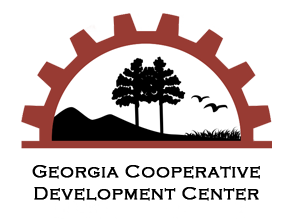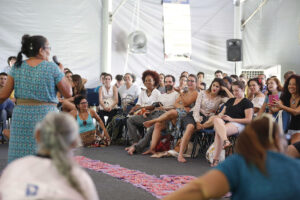Many like to say “we don’t need to reinvent the wheel”, to suggest the borrowing of something that already exists, and works. In “co-op land” this is sometimes called “P6’ing” (in reference to the international cooperative 6th principle of cooperation among cooperatives), and I’ve recently coined another useful phrase for it when it’s coming from a non-co-op source: “ethical repurposing”.
What does this have to do with a co-op academy? Well, suffice it to say I’ve been watching these types of academies, boot camps, fellowships and accelerators being hosted by cooperative development peers for a long time, and behind the scenes, GCDC and Regenerate Atlanta Cooperative Loan Fund (RACLF) have been gearing up to make our own contribution to this particular subfield of co-op development. To help us co-develop this academy, we’ve submitted an idea proposal to SOCAP21, where peers will contribute their two cents to a model that we’re envisioning as distinctly southern, led by majority BIPOC cooperators, and many of whom are worker- or producer-owners of their co-op. To get this idea to SOCAP21, we’re asking for your vote!
So which wheels are we borrowing from? With due credit, we’re inspired by: Green Worker Co-ops in the Bronx, Start:ME in Atlanta at Emory’s Goizueta School of Business, the Propeller Accelerator in New Orleans, and the nationwide Start.coop accelerator, among others.
Ultimately, though, what this academy ends up becoming isn’t totally up to GCDC or RACLF, or even our development peers, and that’s why I’m asking for your input! Head here to tell us what you think the most important topics are, how to deliver them, what time of day, etc. Our initial plan is to kick off in August with an 8 part, 4 month (2x/month) program with each session being around 4 hours each. We’re not sure how many co-op startup teams we want, but probably want to combine conversions and startups to mix and match the needs and strengths. Each team will have a mentor co-op and/or consultant. And of course as teachers of democracy, we’re not going “sage on the stage” and just lecturing through 8 sessions. We’ll be integrating “popular education” (learn more from our friends at TESA) throughout. Take this quote from Paulo Freire:
Liberatory education is fundamentally a situation where the teacher and the students both have to be learners, both have to be cognitive subjects, in spite of being different. This for me is the first test of liberating education, for teachers and students both to be critical agents in the act of knowing.
–A Pedagogy for Liberation: Dialogues on Transforming Education
We’ll be holding the academy online for sure, and possibly a hybrid in-person format. We’ll be bringing together both rural and urban co-ops, and a mix of industries as well as types of ownership.
So why create an academy? A few reasons come to mind. First, it’s efficient. Where one mentor-one mentee relationships are all about depth, an academy creates the opportunity for breadth, whereby numerous co-ops each take a little bit of everyone’s time. Which leads to reason #2: emergent knowledge. When we come together, we’re always smarter than the sum of the intelligence of everyone in the room. Why? Because something magical happens when we think together about important things like: “how are we going to sustain ourselves running our co-ops? How can we grow to sustain even more folks?” This is principle 6 in action, and it helps us get in the mindset of participation as well. After the academy is over, each team will set about taking that participatory ethic into their co-ops, sharing power, sharing knowledge, and sharing the benefits of their labor together in the form of patronage dividends. So many co-ops, as they grow, lose this fire that comes from genuine participation, the practice of democracy, and our academies can stoke that flame, and teach participants to keep it alight over time, and pay the flame forward.
I’m excited to say that I’m working on a new contribution to the field of cooperative development, and this academy will also be my chance to share this new tool, test it, and iterate. Stay tuned for more to come!

